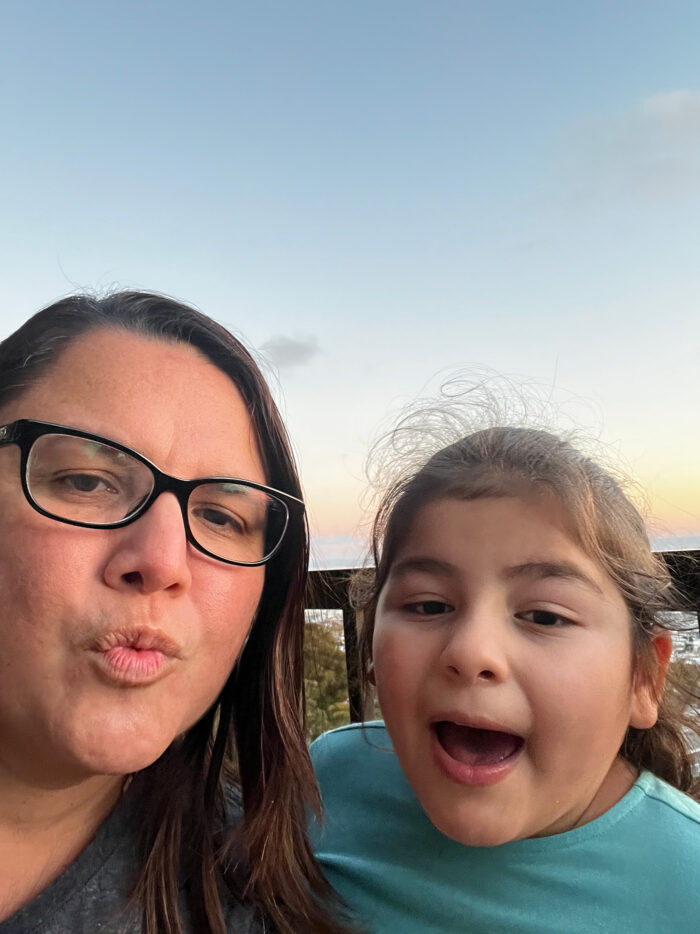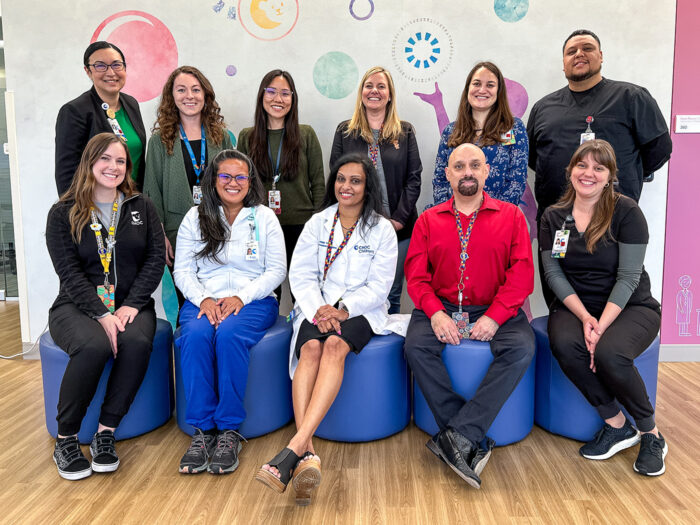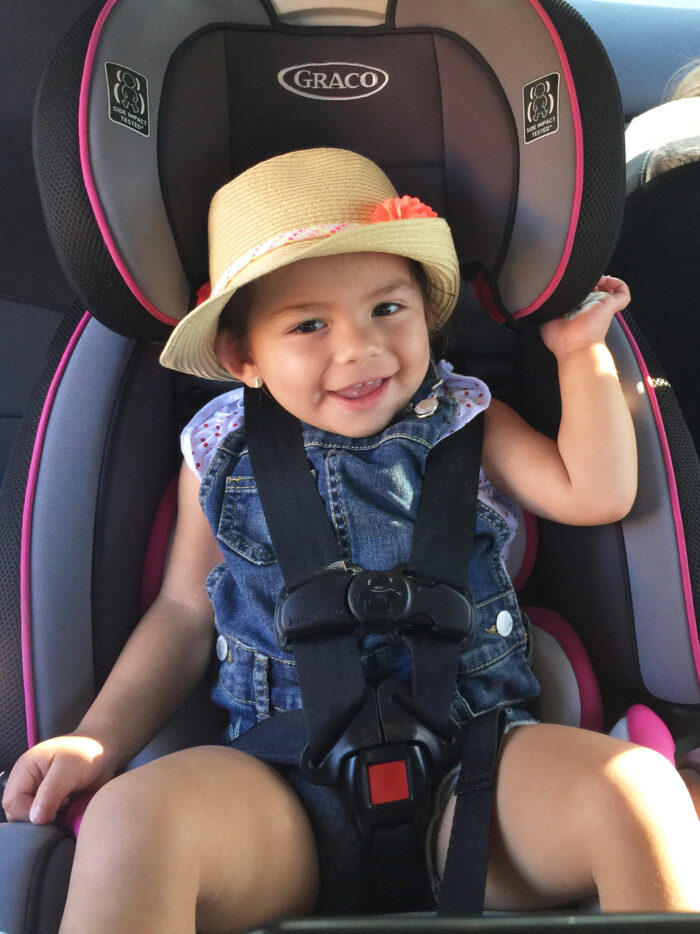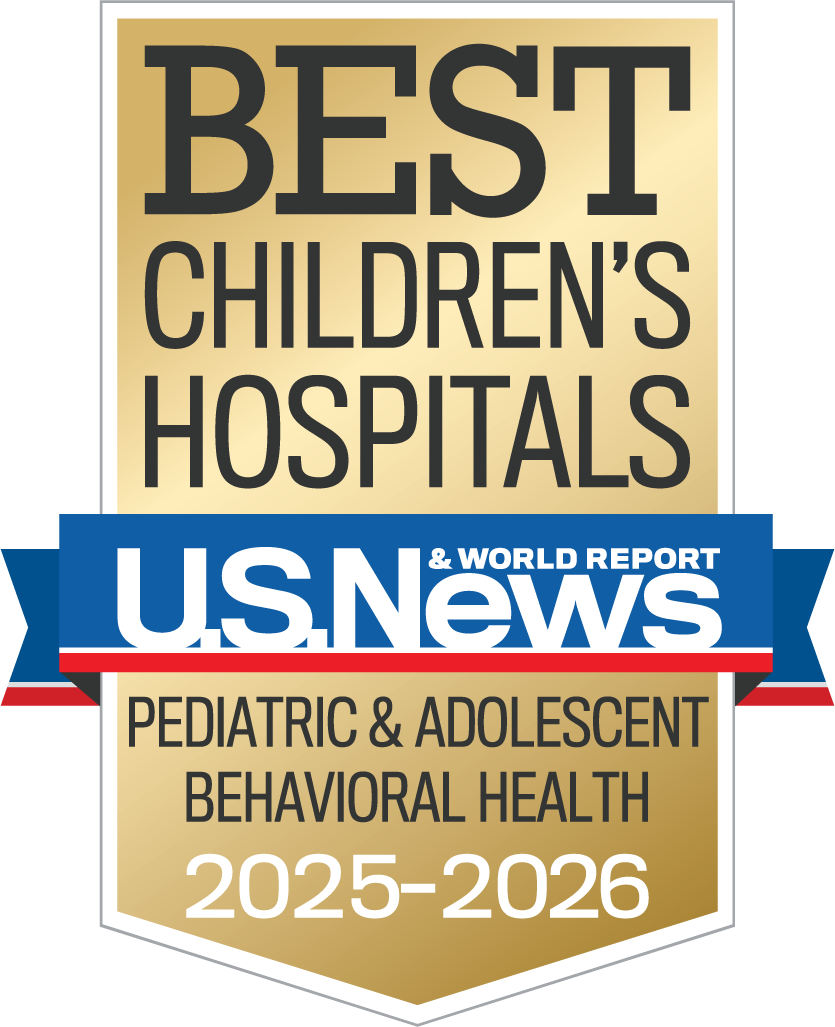7-year-old Katherine can now look her family members in the eye and smile.
Something that wouldn’t be possible without expert care from the Thompson Autism and Neurodevelopmental and Neurodevelopmental Center at CHOC.
When Katherine was about 14 months old, her mom Karla, a longtime CHOC employee, noticed that she wasn’t acting like a typical almost-toddler.
Katherine would play aggressively, hitting and biting her parents. She also wouldn’t look them in the eye and didn’t seem to be listening to them. Karla was worried, so she sought help from CHOC.
After an appointment with pediatric neurologist Dr. J. Thomas Megerian, Katherine was diagnosed with autism spectrum disorder (ASD).
Unique support provided by the Thompson Autism and Neurodevelopmental and Neurodevelopmental Center
Katherine was one of the first patients to receive treatment at the Thompson Autism and Neurodevelopmental and Neurodevelopmental Center. The Center is dedicated to bringing the latest treatments and resources to the autism community in Orange County. Through their unique programs, children have a centralized place where they can receive an early diagnosis, advanced therapy and the possibility to reach their true potential.
Katherine’s ASD treatment is an ongoing journey; it has been full of challenges and exciting progress.
Karla credits the entire team — physicians, psychologists, nurses, applied behavior analysis (ABA) specialists, child life, medical assistants, social workers, resource specialists and financial advisors — at the Thompson Autism and Neurodevelopmental and Neurodevelopmental Center for their support.
Doctor’s appointments can be traumatic for kids with ASD
At the beginning of her treatment, Katherine would be upset during her appointments at the Center. Taking her vitals or measurements was a challenge. She would cry and refuse to let anyone touch her.
“For kids with ASD or a neurodevelopmental disorder who can’t communicate, getting vitals taken may be on the same traumatic level as a major procedure for other kids,” says Dr. Megerian. “They don’t know what is being done to them because they don’t understand it.”

The Center is specially designed to make appointments as easy as possible for patients. Shanna Roenicke, the Center’s dedicated child life specialist, was especially instrumental during Katherine’s appointments. She was able to soothe Katherine while making her feel special.
“Everyone was so wonderful. The receptionists, medical assistants, nurses and child life,” says Karla. “They would be waiting for us when we arrived with a bubble machine and allowed extra time to calm Katherine down during our appointments. We were never rushed.”
Now, Katherine marches into the Center and goes straight upstairs to have her weight and height measured.
“She knows she’s safe there,” says Karla.
Although Katherine has made so much progress, there have been challenges to overcome.
Treating ASD co-occurring conditions, all in one place
Katherine is non-verbal and would have aggressive behaviors like hitting or biting her family members or other kids. She also would cry, throw tantrums and be unable to pay attention at school.
Additionally, it’s common for children with autism to have co-occurring conditions (other medical conditions). Katherine has attention deficit hyperactivity disorder (ADHD), gastroenterology (GI) issues and a sleep disorder.
“We didn’t know what was going to happen from day to day. Katherine was aggressive, throwing up and not sleeping,” says Karla. “We didn’t know how to communicate with her and manage her behavior.”

The Center coordinated appointments for Katherine to see other CHOC specialists for treatment for her other conditions.
“At CHOC, we are fortunate to have access to specialists from other areas,” says Dr. Megerian. “We will have multiple specialists come to the Center so we can simplify the number of appointments for patients. Our specialists will also work together to streamline treatment for multiple conditions at once.”
Managing aggressive behaviors associated with ASD
The Center’s psychologists and ABA specialists also helped Karla with strategies to help calm Katherine and to manage her behavior challenges.
Dr. Lauren Couch, pediatric psychologist, made Karla “stop” and “go” signs to place on the doors of different rooms at home. If the sign was red for stop, Katherine learned that she could not go into a certain room that was dangerous for her. If the sign was green, she was free to go into that room and play.
Dr. Couch helped Karla set up a daily routine for Katherine so they could both know what to expect from each day.
Tremendous progress, a hopeful future
The Thompson Autism and Neurodevelopmental and Neurodevelopmental Center worked with Karla and her family to find the right medications for Katherine. It was a long and arduous process, recalls Karla, because some medications weren’t effective in managing behaviors or would cause challenges for Katherine’s other conditions.
Get more expert health advice delivered to your inbox monthly by subscribing to the KidsHealth newsletter here.
“Our families are so patient when it comes to finding the right medication,” says Dr. Megerian. “Unfortunately, science is not yet at a point where we can know for sure how a child will respond to medication. We can get close, but we must rely on trial and error.”
Finally, they found what worked best for Katherine.

With the medications, strategies for behavior management and resources, Katherine’s behaviors drastically improved.
“Katherine has made so much progress over the past few years,” says Dr. Megerian. “She’s much calmer and happier, and her real personality is coming out.”
Katherine can now enjoy her favorite activities like playing outside or coloring. She attends a great school that was recommended by the Center and is becoming more social. Katherine will now hug her family members and look them in the eye. Her family understands that this is how she says, “I love you.”
“We know that Katherine sees us now,” says Karla. “Our whole family’s lives have changed, not just hers.”
In the future, Karla hopes that Katherine becomes as independent as possible and can develop skills for taking care of herself. With help from speech and occupational therapy, Katherine may learn how to say a few words. Dr. Megerian also hopes for the absolute best for her.
“We want Katherine to have an admirable life,” he says. “That’s our greatest hope for all of our patients.”
Get more expert health advice delivered to your inbox monthly by subscribing to the KidsHealth newsletter here.

Learn more about the Thompson Autism and Neurodevelopmental Center at CHOC
CHOC Hospital was named one of the nation’s best children’s hospitals by U.S. News & World Report in its 2024-25 Best Children’s Hospitals rankings and ranked in the behavioral health specialty.





